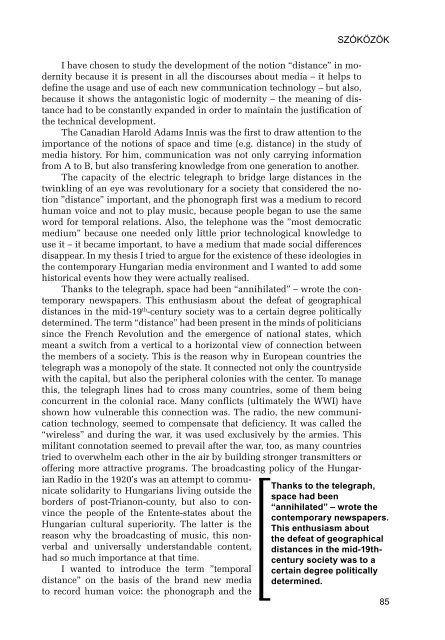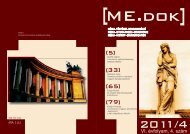A méhkas szelleme - ME.dok 2012/2
A méhkas szelleme - ME.dok 2012/2
A méhkas szelleme - ME.dok 2012/2
Create successful ePaper yourself
Turn your PDF publications into a flip-book with our unique Google optimized e-Paper software.
I have chosen to study the development of the notion “distance” in modernity<br />
because it is present in all the discourses about media – it helps to<br />
define the usage and use of each new communication technology – but also,<br />
because it shows the antagonistic logic of modernity – the meaning of distance<br />
had to be constantly expanded in order to maintain the justification of<br />
the technical development.<br />
The Canadian Harold Adams Innis was the first to draw attention to the<br />
importance of the notions of space and time (e.g. distance) in the study of<br />
media history. For him, communication was not only carrying information<br />
from A to B, but also transfering knowledge from one generation to another.<br />
The capacity of the electric telegraph to bridge large distances in the<br />
twinkling of an eye was revolutionary for a society that considered the notion<br />
”distance” important, and the phonograph first was a medium to record<br />
human voice and not to play music, because people began to use the same<br />
word for temporal relations. Also, the telephone was the ”most democratic<br />
medium” because one needed only little prior technological knowledge to<br />
use it – it became important, to have a medium that made social differences<br />
disappear. In my thesis I tried to argue for the existence of these ideologies in<br />
the contemporary Hungarian media environment and I wanted to add some<br />
historical events how they were actually realised.<br />
Thanks to the telegraph, space had been “annihilated” – wrote the contemporary<br />
newspapers. This enthusiasm about the defeat of geographical<br />
distances in the mid-19 th -century society was to a certain degree politically<br />
determined. The term “distance” had been present in the minds of politicians<br />
since the French Revolution and the emergence of national states, which<br />
meant a switch from a vertical to a horizontal view of connection between<br />
the members of a society. This is the reason why in European countries the<br />
telegraph was a monopoly of the state. It connected not only the countryside<br />
with the capital, but also the peripheral colonies with the center. To manage<br />
this, the telegraph lines had to cross many countries, some of them being<br />
concurrent in the colonial race. Many conflicts (ultimately the WWI) have<br />
shown how vulnerable this connection was. The radio, the new communication<br />
technology, seemed to compensate that deficiency. It was called the<br />
“wireless” and during the war, it was used exclusively by the armies. This<br />
militant connotation seemed to prevail after the war, too, as many countries<br />
tried to overwhelm each other in the air by building stronger transmitters or<br />
offering more attractive programs. The broadcasting policy of the Hungar-<br />
ian Radio in the 1920’s was an attempt to communicate<br />
solidarity to Hungarians living outside the<br />
borders of post-Trianon-county, but also to convince<br />
the people of the Entente-states about the<br />
Hungarian cultural superiority. The latter is the<br />
reason why the broadcasting of music, this nonverbal<br />
and universally understandable content,<br />
had so much importance at that time.<br />
I wanted to introduce the term ”temporal<br />
distance” on the basis of the brand new media<br />
to record human voice: the phonograph and the<br />
SZÓKÖZÖK<br />
Thanks to the telegraph,<br />
space had been<br />
“annihilated” – wrote the<br />
contemporary newspapers.<br />
This enthusiasm about<br />
the defeat of geographical<br />
distances in the mid-19thcentury<br />
society was to a<br />
certain degree politically<br />
determined.<br />
85



